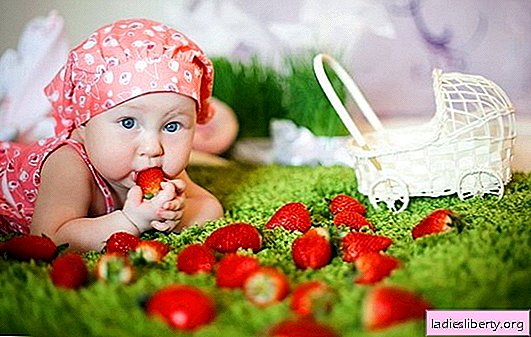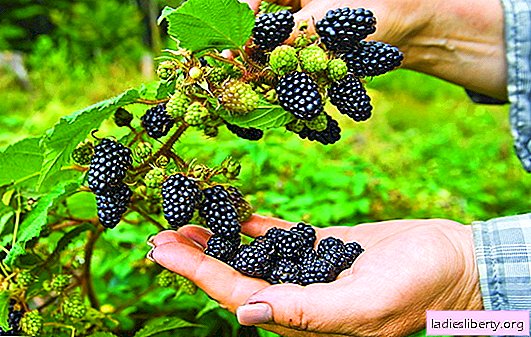
Strawberries occupy a special place among other berries and fruits, since from late May to mid July it becomes a popular and widespread treat.
Shop and market stalls offer you to buy a delicious treat, and gardeners and gardeners every day have the opportunity to collect a new crop.
Saturated color, recognizable aroma, pleasant taste - these are all strawberries, the health benefits and harm of which often become a significant issue for parents, doctors, pregnant women and nursing mothers.
To enjoy summer delicacies safely, it is important to know which vitamins are contained in strawberries, and in which cases it can harm the body.
Strawberries: Health Benefits
The beneficial properties of strawberries and the effect on the body is due to its composition. Every person who is trying to figure out how useful this berry is interested in what vitamins are contained in strawberries. The main ones are:
• fructose, glucose and sucrose;
• fiber;
• vitamins A, B and C;
• tannins and pectin substances;
• malic and citric acid;
• phenolic compounds;
• fluorine, iron, manganese and copper.
Such a unique composition saturates the body with useful substances and has a positive effect on human health. It is especially important to get all these vitamins in early summer, when after winter the body is exhausted and weakened. Among the main points of the beneficial effects of strawberries are:
• strengthening the immune system and increasing the resistance to viral diseases;
• organic acids have antibacterial effects on the body;
• normalization of pressure and cardiovascular system;
• help in the work of the stomach and intestines, especially for people who suffer from constipation;
• activation of metabolic processes in the body.
Due to such a beneficial effect on human health, doctors recommend that during the period of active ripening of red berries, eat at least 150-200 g of strawberries per day. This charge of vitamins and minerals is enough for the whole fall and winter.
Strawberry: health benefits and harms, contraindications and possible complications
Like any product that is consumed in large quantities, strawberries can harm the body if you overeat. Specialists and doctors do not recommend eating more than 500 g of berries per day.
In addition, it is worth considering that strawberries are an allergen, therefore, they can cause individual reactions in the body. When giving a child strawberries for the first time, you need to carefully monitor his state of health and well-being.
Having learned what vitamins are contained in strawberries, many decide to eat them as much as possible, buying in a store and on the market all the goods in a row. However, there are also dangerous cases, if the purchased strawberries are spoiled or initially not a natural product. For the beauty of the berry, as well as the possibility of its long-term storage, gardeners can use chemicals. Especially carefully you need to buy berries in the off season.
The least risk of poisoning and harming your body from strawberries grown in your own area and under proper conditions. If you eat it a little every day, wash it thoroughly and choose only ripe berries, the body will receive only benefits and vitamin support.
Can strawberries be given to nursing mothers and young children
Knowing what vitamins are contained in strawberries, and how useful it is for the body, many try to regularly supplement the diet with fresh berries. Her pregnant women and young children are especially fond of. With the birth of a child, a young mother is seriously reviewing her diet and restricting the use of many foods, but it can be difficult to refuse a treat, especially if the red berry season is coming.
There are several answers to the question whether strawberries can be given to nursing mothers, although each woman makes the final decision herself:
• if the baby was born in May-June, from the first days of his life, mother cannot eat strawberries even in small quantities, one berry can cause an allergic reaction if it enters the body of a newborn through milk;
• if the peanut in May-June was 4-5 months old, the time of the first feeding is nearing, mother can try one berry, watching the child’s reaction after feeding - in the absence of diathesis, you can allow yourself one or two strawberries per day;
• if the baby is more than 7-8 months old, the mother can try the berry and observe its reaction, and if there is no allergy, eat up to 100 g of strawberries per day.
When trying strawberries for the first time, a nursing mother must be sure that she doesn’t eat any more new foods that day. Then we can with full confidence judge the child’s reaction to this particular berry.
Having received the answer to the question whether it is possible for nursing mothers to strawberries, and understanding all the consequences of the incorrect use of the berry, many parents are interested in how old children can eat it. Up to a year, pediatricians categorically do not recommend including strawberries in the child’s diet, even if the season is in full swing. After the baby’s first birthday, you can, if the time of year allows, you can give one or two berries a try. The process of increasing the volume eaten per day should be gradual with constant monitoring of the reaction of the child.
How to eat strawberries for maximum benefit
The most useful berry is freshly picked from its own garden bed and thoroughly washed. Although nutritionists and experts recommend using it with sour cream or cream, so that the fatty product creates a protective film on the stomach and intestines. Strawberries contain acids that can irritate the mucous membrane. Another product in combination with which strawberries are healthy and tasty is cottage cheese.
When buying berries in the market, it is worth asking the seller to try strawberries. This will make sure its sweetness, then add less sugar. The berry contains a sufficient amount of glucose and fructose, so do not sweeten it.
Since the strawberry season ends pretty quickly, you want to keep the taste and benefits of strawberries for a longer period. There are two ways to close the berry for the winter: grind with sugar and cook jam. Strawberry compotes are a tasty and healthy drink, but they are rarely closed, because it is a pity to preserve water. Sometimes, with a good refrigerator, strawberries are frozen for the winter. After defrosting, it becomes soft and loses its shape, but at the same time remains as tasty and healthy as in summer. It can be used to make smoothies, ice cream and cakes.
Another method of preserving strawberries and its beneficial properties is the drying of summer berries. In the process of drying the water leaves it, but vitamins and minerals remain. It is important to store the dried berry correctly so that it does not deteriorate.
Thus, it is clear why everyone likes strawberries so much, the health benefits and harms of which are due to the implementation of the rules for their use. Knowing what vitamins are contained in strawberries, adults and children are happy to supplement the berry with their diet and enjoy its pleasant taste. And nursing mothers and young children should take care of their body so that later they can safely eat strawberries and not worry about the occurrence of allergies.











